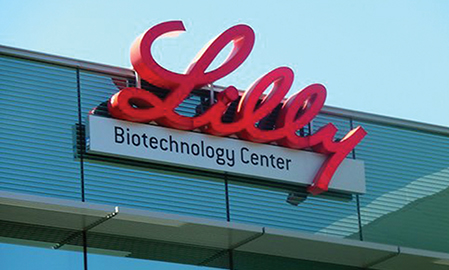Eli Lilly is set to begin the first half of its financial two-step Tuesday when it announces guidance for 2014, and then rounds out the news Jan. 30 when it releases fourth-quarter and annual financial data.
The Indianapolis, IN, drugmaker’s patent-loss tussle will continue this year, marked by osteoporosis med Evista’s going generic in the US in March and depression drug Cymbalta becoming patent-free in the EU in August. The company is also awaiting word on the future of its patent for cancer drug Alimta, which will have an impact on how investors assess the company’s near-term hurdles: A worst-case scenario could put the drug in the generic-eligible bin in 2017 if the company loses its court bid to extend the patent until 2022.
Leerink Swann analyst Seamus Fernandez wrote in a research note Friday that the Alimta issue is among his list of “critical valuation drivers in 2014,” with others being trial results and/or regulator opinions of drug candidates including gastric cancer drug ramucirumab, the Lilly-Boehringer diabetes drug empagliflozin, and diabetes treatment dulaglutide.
Lilly’s commitment to the diabetes business has only deepened in the past year, including the November 2013 announcement that it invested $1 billion in improving its diabetes manufacturing capacity in 2013, half of which was spent in town, at its Indianapolis insulin manufacturing sites.
While diabetes remains a stronghold, Lilly announced in October that its post-2014 success will hinge on additional disease states, including oncology (the Alimta issue), emerging markets and animal health.
Bernstein analyst Tim Anderson wrote in a December research note that sell- and buy-side analysts are keeping the company at arm’s length because of the hurdles the company has in front of it over the next 12 months. He wrote that Lilly has potential upside for those willing to look past 2014 and focus on the company’s pipeline potential.
Leerink’s Fernandez added that corporate options for enhancing the company’s value include buying Novartis’s animal health business, as well as purchasing full rights to diabetes medications including insulin glargine, empagliflozin and Tradjenta.
The company has also been chipping away at costs, of which Fernandez is also a fan. The company announced in its third-quarter earnings call that it was cutting its sales and marketing efforts behind Cymbalta, which went generic in December, and was tapering its promotion activity for Evista which goes generic this year. CFO Derica Rice said in October that the company is committed to hitting at least $20 billion in sales this year.








